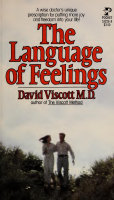Back • Return Home
 |
Full Title: |
The Language of Feelings |
| Author(s): |
David Viscott, M.D. |
| Publishing / Edition: |
Pocket Books, 1976 |
Click here for the Table of Contents of the book
Content Review
The first chapter, entitled "Feelings", is almost like a bird's-eye-view of the entire book. There are many little gems of insight into the nature of feelings sprinkled throughout this chapter, so it is a bit tricky to distill all of it down into any sort of brief statement. However, we will make an attempt. The author generally defines feelings in the following manner, to paraphrase:
Our feelings are the link that connects outside stimuli to internal impressions. They summarize what we have experienced and tell us if it is pleasurable or painful. When a sensory stimulus is considered "too strong" it is perceived of as pain and an avoidance response arises. This avoidance can take on the form of defense (attempting to block out the source of pain) and/or endurance (attempting to cope with the pain). Neither of these reactions are "bad" per se, so long as we do not go to extremes. They are merely attempts to resolve the situation. All beings have a general tendency to try to maximize pleasurable feelings and minimize painful ones. However, because our feelings sometimes appear due to unresolved past issues instead of as a response to the present moment, our means of understanding and directing them towards a balanced expression may not always be effective.
Now, this is where his presentation on feelings becomes quite intriguing...He states that there are certain guiding motivations that develop as we grow:
• We move from living a life of Dependency to one of Independence
• We move from attempting to gain Mastery to gaining Freedom
• We move from attempting to find Identity In Others to finding Comfort In Oneself
The premise is that, if we do not fully make these transitions, our ability to effectively understand and direct our feelings is hindered. To continue...
One feeling that is prevalent throughout these transitions is "anxiety", which he defines as "the fear of hurt and loss". Therefore, each of these is associated with a different kind of perceived loss:
• Dependency → Independence might sometimes be interpreted as a loss of Love
• Mastery → Freedom might sometimes be interpreted as a loss of Control
• Identity In Others → Comfort In Oneself might sometimes be interpreted as a loss of Self-Esteem
A natural reaction to these loses is "anger". If this anger has no healthy outward expression, it is directed inwardly and becomes "guilt". In turn, if such guilt is left unresolved, then it deepens into "depression". Depression is exhausting because it consumes all of our energy to try to wall off our feelings instead of finding constructive ways of expressing them. This can take on many forms, such as striving towards "perfectionism" while trying to deny our own imperfections.
The rest of the chapters of the book elaborate on this pattern of anger, guilt, and depression. While it is a short book, there is a lot of important information here. Some of it might be "a hard pill to swallow" if we are used to repressing our own emotions and/or ignoring the emotions of others. I wish it was still in print. It is well worth reading!
Related Resources
• Borrow the eBook from Internet Archive
• Night Talk with Dr. David Viscott
In the 80s and early 90's, David had both a radio talk show and a couple of TV shows where people would call in for advice. The YouTube channel VHSarchives has graciously uploaded many clips from one of these shows.

